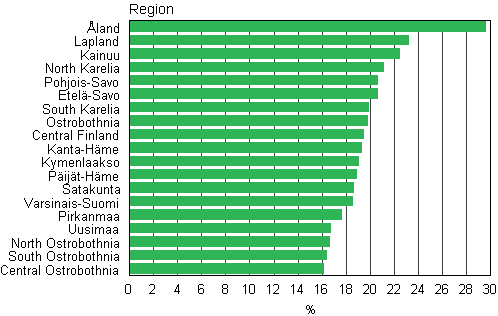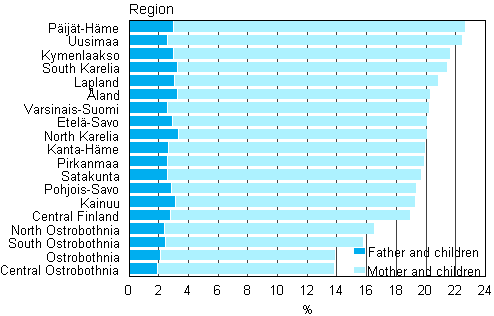4. No variation between areas in prevalence of families with children
4.1 Number of cohabiting couples highest in Åland and lowest in Central and South Ostrobothnia
The commonest type of family with children in all regions is one of a married couple although there are also clear differences in this. The differences arise from the prevalence of families of cohabiting couples and one-parent families in the regions. Åland and Lapland have the highest relative numbers of cohabiting couples. Central and South Ostrobothnia represent the other extreme.
In Åland 30 per cent and in Lapland 23 per cent of families are families of cohabiting couples. The share of cohabiting couples is higher than the average for the whole country in 14 regions and lower than the average in five regions (Figure 7).
Figur 7. Families of cohabiting couples as a proportions of families with underage children by region in 2010

When examining the prevalence of cohabiting couples by municipality, the municipalities of Åland are in the lead. Of the municipalities of Mainland Finland, Luhanka in the region of Central Finland is at the top of the list with 33 per cent. In Pelkosenniemi 32 per cent of families with underage children are families of cohabiting couples. In Savukoski the respective proportion is 31 per cent and in Närpiö and Maalahti 30 per cent. The municipality in Mainland Finland with the lowest share of seven per cent of families of cohabiting couples with children is Luoto.
4.2 Päijät-Häme and Uusimaa have highest proportions of one-parent families with children
There is also clear regional variation in the prevalence of one-parent families. In the figures for the regions, the Ostrobothnian regions differ from other regions in favour of the conventional family (Figure 8). The numbers of one-parent families are lowest there. Päijät-Häme and Uusimaa have the highest proportions (23%) of one-parent families with children. Lahti puts the share up for Päijät-Häme, and Helsinki for Uusimaa.
Figure 8. Proportion of single-parent families of all families with underage children by region in 2010

The regional variation in the proportion of one-parent families with children is due to differences in the shares of families of the type mother and children. The proportion of families of the type father and children ranges from two to three per cent in all regions.
Examined by municipality in Mainland Finland, the proportions of one-parent families with children are the highest in Helsinki (29%), Turku and Hartola (27%), and Harjavalta and Lahti (26%). Åland has the highest figures for the whole of Finland (Sottunga 45%, Brändö 30% and Mariehamn 28%) but in the case of Sottunga and Brändö it should be borne in mind that in municipalities of this size the difference of just a couple of families can alter the percentage share considerably.
In Mainland Finland, the lowest relative proportions of one-parent families can be found in Luoto (4%), Pedesröre (5%) and Yli-Ii (6%), and in Åland, in Vårdö (7%).
Luoto could be viewed as the most conventional municipality in terms of family structure, because it has the lowest proportion of one-parent families with children and the highest proportion of married couples in the whole country. After Yli-Ii (2.88), Sievi (2.85), Merijärvi (2.84) and Perho (2.78) Luoto also has the fifth highest average number of 2.74 of underage children living at home per family. The average for the whole country is 1.83.
The marital status of the majority of the fathers and mothers of one-parent families with children is divorced. Only six per cent of the fathers and three per cent of the mothers are widowed. Dissolved cohabiting partnerships have increased the numbers of unmarried mothers or fathers of one-parent families with underage children. As many as 41 per cent of the mothers of mother and children families and 27 per cent of the fathers of father and children families are unmarried (Table 3, Chapter 1).
Source: Population and Cause of Death Statistics, Statistics Finland
Inquiries: Marjut Pietiläinen (09) 1734 2798, Timo Nikander (09) 1734 3250, vaesto.tilasto@stat.fi
Director in charge: Jari Tarkoma
Updated 30.11.2011
Official Statistics of Finland (OSF):
Families [e-publication].
ISSN=1798-3231. Annual Review 2010,
4. No variation between areas in prevalence of families with children
. Helsinki: Statistics Finland [referred: 19.4.2025].
Access method: http://stat.fi/til/perh/2010/02/perh_2010_02_2011-11-30_kat_004_en.html

